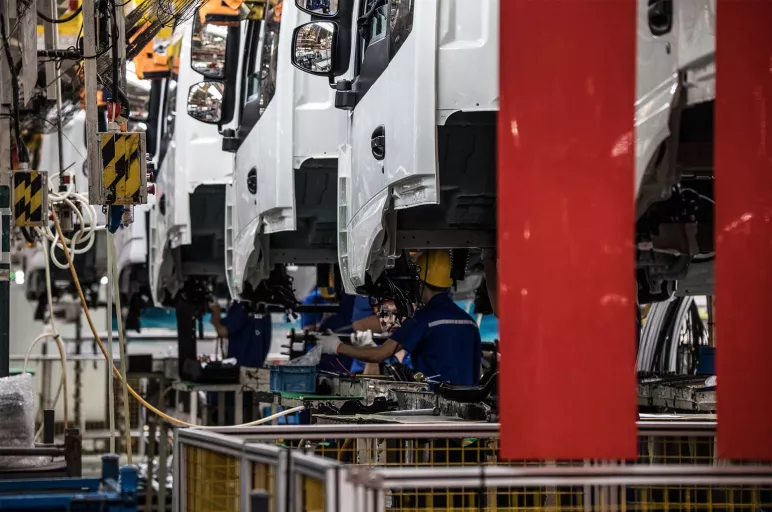
When the Chips are Down: How Automakers Can Tide Over the Semiconductor Crisis
- Amid the continued shortage of semiconductors, automobile production in 2022 is likely to remain low
- Car manufacturers are trying out several strategies like developing their own chips to ensure supply
- They should also invest in capabilities such as supplier forecast collaboration and multi-sourcing to mitigate risks
May 20, 2022 | Automotives 3 minutes read
Automobiles — from four-wheelers to motorcycles — are facing a shortage of microchips globally. This shortage was caused by a massive increase in demand for other electronic appliances such as laptops, cellular devices, medical devices, and home appliances during the COVID-19 pandemic that surpassed the current supply of semiconductors.
In 2021, global production loss of light vehicles was 1.4 million in Q1 2021, 2.6 million in Q2, and 3.4 million in Q3, according to IHS Markit data. It has further downgraded the automobile production forecast for 2022. The outlook for light vehicle production has been reduced by 498,000 units in Europe and by 396,000 units in Greater China and for 2022. The outlook for North America stays flat at 14.75 million units.
Passenger vehicle sales in key markets such as India declined by 10.7% in 2021 from a year ago, according to the Federation of Automobile Dealers Association.
What automotive companies should do to manage the shortage
1. Develop own microchips for key components
Manufacturing your own semiconductors gives control over the integration of software and hardware components and can be differentiated from the competition. Specifically designed chips can help reduce energy consumption for devices and products from the specific domain of the company.
Hyundai Motors has announced plans to manufacture and develop its chips for independency than relying upon chipmakers. Ford is also planning to make its computer chips by developing new technologies. General Motors also plans to manufacture its own chips.
Many companies are also coming together to incorporate semiconductor joint-venture projects to increase capacity and increase access to new markets and distribution networks. Toyota Motor Corporation and Denso Corporation as well as Vedanta and Foxconn have launched or are in the process of launching semi conductor manufacturing facilities.
2. Establish Long-term Contracts
Overall, the demand for chips increased by about 17% to 20% per annum, compared to a roughly 6% to 7% p.a. increase in manufacturing capacity between 2020 and 2022.
That’s why long-term commitments signal a mutual feeling of trust. This may enable partners to redesign chips or ensure a buffer supply of chips, whereas companies like Tesla are releasing products with excluded features, which can be included later. Ford, Stellantis and BMW have signed agreements with chip manufacturers to secure chip supplies.
3. Technology and Supply Chain Strategies
Handling a diverse workforce on-site, monitoring their performance, and developing systems that increase their engagement, productivity and collaboration are of utmost importance.
Mercedes-Benz partnered up with Taiwan chip suppliers to set up a proper supply chain process to ensure the availability of semiconductor chips. Direct investments in production would ensure a one-on-one communication line with all chips manufacturing. Diverting chips to high-demand segments, such as SUVs, from mid-demand segments such as sedans are also tactics currently used by automakers, especially in India.
Steps to improve the chips supply chain
Organizations can develop an in-depth analysis that will draw up better short- to mid-term plans to mitigate risks and prevent disruption.
Supplier forecast collaboration
Companies can collaborate with key suppliers in real time and gain greater visibility into supply and demand as well as suppliers’ processes and timelines to draw up accurate forecasts and inventory plans
Advance ordering
Sharing of long-term forecasts with suppliers and placing orders three, six, or 12 months in advance will result in securing supplies and building up additional inventory.
Strong relationships with OEMs and distributors
Companies can deepen partnerships with existing key suppliers and establish business relationships with equipment manufacturers.
Multi-sourcing
Companies can opt to split up purchasing volume to reduce the risk of supply disruption or stockouts.
By diverting and prioritizing the production of chips required for high-demand segments, automobile manufacturers can decrease the gap between supply and demand. By establishing joint ventures with semiconductor manufacturers and vendors, companies can strengthen their market growth and increase sales.
Turn ideas into action. Talk to GEP.
GEP helps enterprise procurement and supply chain teams at hundreds of Fortune 500 and Global 2000 companies rapidly achieve more efficient, more effective operations, with greater reach, improved performance, and increased impact. To learn more about how we can help you, contact us today.

Krish Vengat N.
Vice President, Consulting
Krish is a seasoned procurement and supply chain management professional proficient at delivering sustainable cost savings and process improvements across industries. He has been a part of multiple procurement transformation initiatives and secured around a billion dollars of savings in direct- and indirect-related spend and supply chain operations. His clients at GEP include Fortune 500 companies, primarily in CPG, automotive, and industrial manufacturing.



